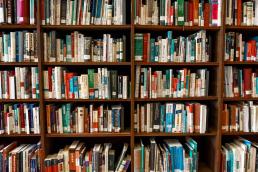Years ago, I used to spend an average of MYR 200 a month on books. Sometimes, it’s a premeditated purchase; a book I’ve noticed on a shelf for weeks. Sometimes, it’s done on a moment’s whim – simply because I must have it there and then.
Needless to say, I built a mini library filled with books of all size and thickness, adding at least two every month. It usually gets worse during mega book sales like the annual Big Bad Wolf Book Sale where you can get a paperback for as cheap as MYR 2. It isn’t unusual to see people carrying large empty boxes (provided by the organizers themselves) and filling it up with books.
We’ve often talk about the embarrassing and often-cited statistic of Malaysians reading two books a year. To be fair, that number was released in the 2005’s National Literacy Survey. The latest numbers in 2010 racked up the amount up to 8 books, which is a big improvement. The old adage of “Malaysians don’t read” is hard to believe. Especially if you observe just how popular the independent publishing scene is flourishing, and the prevalence of romance and religious books dominating shelves in local stores.
Are we reading? Beyond online articles, yes, I believe so. But it’s not hard to deny that accessibility, price and our perception towards books also shapes our reading habits.
Reading as a Tool for Success
No one’s disputing the benefits of reading. Since young, we’re taught that reading is highly revered and those who read a lot are deemed knowledgeable folks. However, we need to address the fact that our attitudes towards reading differs between those in different economic classes.
When you’re tight on resources, reading becomes utilitarian as opposed to for leisure. You don’t read books to escape into your imagination or to find sources of inspiration. Books and the knowledge it holds become the tools you need to pass your exams, get enough information on a project you’re working on, etc. You can’t afford to set aside a few hours for J.K.Rowling’s Harry Potter and the Philosopher’s Stone. Not when that time can be used to earn money and do more productive things.

However, growing up in better socioeconomic conditions, this attitudes towards reading changes. If I were to take myself for example, reading was taught to me as something I do for fun as well as for my own development. Reading was a tool for success and knowledge, yes. But it was also more than that. It was a gateway to humanity and self-reflection. Perspectives that would be lacking if you grew up instead in an environment that taught you books had a one specific purpose: knowledge.
If anything, government institutions like Dewan Bahasa dan Pustaka themselves stress on the importance of reading, but through the lens of knowledge. Shaping a rhetoric surrounding the culture of reading and books.
In the end, it also boils down to book prices. In an economy that is not doing so well, Malaysians are right to worry more about getting by and books are seen more as luxury than need. When an average meals costs MYR 6 and a paperback costs at least MYR 20 (four times more) – the decision isn’t a difficult one.
Sometimes however, you encounter policies in other countries that curb this trend, such as France. They’ve enforced a policy to keep books at a fixed price; a law that’s been around since 1981. A fixed price (as well as accessibility) not only increases competition among publishers, but change public attitude towards books. And by extension, reading.
Books as a Status Symbol
Beyond accessibility, books also carry a status symbol. With collector’s editions, hardcover, softcover and the different genres taken into the mix – a book isn’t just about its content. It’s also about what it means to read certain types of books.
Romance novels are aplenty in among the Malaysian publishing scene, as well as an audience that loves it. But it’s not uncommon for romance readers to receive a bad rep simply because of their reading choices. Aside from corny plots, dialogues and often misogynistic elements – the intellectual standards of romance readers aren’t often thought of highly. Even if they happen to enjoy reading other materials.
On the other hand, claiming to have read Homer’s thousand-paged Odyssey (I haven’t and will not) seems to carry an intellectual and classical weight behind it. So complex is the text that it’s spawned several guides and cliff-notes in order to understand it. Those who claim to have read it are either very intelligent or lying. Mention that you read classics or philosophy, and people would view you as a serious literary reader.
Yet you wouldn’t get the same respect if you said you enjoyed reading Fifty Shades of Grey, despite being an intellectual who understands Nietzsche.

Books are such a status symbol, that being able to afford a library can be seen as both a sign of wealth and education. There are services out there like Books By The Foot that supplies you a library to your specifications: genre, color, height, editions, etc. You name it. The privilege of book collections is unlikely to be found in those who are in a less favorable socioeconomic position.
Thinking about reading culture, class and accessibility has further made me appreciate just how different our approaches are when it comes to books. It’s encouraging to see the rise of indie publishing and how they’re trying to democratize a market that’s long been dominated by big publishers. A lot of rules have changed, such as grammar, standards as well as approaches. When it comes to pricing, indie publishers usually set it to a standard MYR 20.
The rise of reading can’t be all attributed to this group alone – but at least when it comes to accessibility, we’re seeing some headway. Maybe there’s hope yet to push the reading numbers up.
I’ve discussed about reading culture and class on BFM 89.9’s Bila Larut Malam, which you can listen here. The discussion is in Malay:
Recommended Reading:
- Books News – Company Spotlight: Malaysia – Publishers Weekly
- Why Fixed Book Price is essential for real competition – International Publisher’s Association
- Budaya Ilmu Dalam Kalangan Rakyat Malaysia – Klik Web DBP
- Rakyat Malaysia ‘memilih’ dalam membaca – Sinar Harian
- Malaysian’s Reading Habits – Christopher Teh